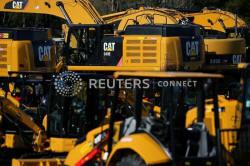U.S. heavy equipment makers feeling pain from tariffs,
disputes: report
 Send a link to a friend
Send a link to a friend
 [March 18, 2019]
By Timothy Aeppel [March 18, 2019]
By Timothy Aeppel
(Reuters) - U.S. makers of bulldozers and
other heavy equipment are raising prices, losing sales and in some cases
beginning to trim workers in response to the Trump administration's
protracted trade disputes with various countries, according to a new
report.
Advocates of tariffs point to continued job growth and low overall
inflation as proof that tariffs are not harming these manufacturers,
which include global producers such as Caterpillar Inc, Alamo Group Inc
and Terex Corp.
But an economic analysis conducted on behalf the Association of
Equipment Manufacturers and set to be released on Monday by IHS Markit,
notes that increased costs and the disruption of supply chains will
slowly filter through the overall economy, gradually raising prices for
finished goods and curbing employment over the next decade.
Scott Hazelton, a co-author of the report, said tariffs will increase
the cost of producing off-road equipment in the U.S. between 6 percent
to 7 percent over the period.
Caterpillar, a key component of the Dow, has said tariffs cost the
company $100 million last year.

The study notes heavy equipment makers are particularly exposed to
higher steel prices. Accounting for all steel used - both directly by
these manufacturers and the parts they buy from others - the material
represents 18.5 percent of the cost of a farm machine and 25.8 percent
for mining machines.
"If you’re a domestic producer, you’re caught between eating a cost
increase or raising prices and potentially losing business,” Hazelton
said.
Gradall Industries Inc is among those getting hit at both ends of their
business. The company, a subsidiary of Alamo Group Inc, has seen the
price of massive metal castings it imports from China go up by 25
percent due to tariffs, for instance, on top of higher domestic steel
prices.
[to top of second column] |

Caterpillar Inc. equipment is on display for sale at a retail site
in San Diego, California, U.S., March 3, 2017. REUTERS/Mike Blake

Mike Haberman, president of Gradall, said they raised prices twice last year in
response to higher-cost imports and steel.
Meanwhile, "our exports to China are down 30 to 40 percent," said Haberman, due
to retaliatory tariffs China slapped on imports of Gradall’s machines and the
economic slowdown in that country.
The Section 232 tariffs imposed by Washington hit most foreign suppliers of
metals, which have prompted retaliatory duties from many of those countries.
Haberman said he has not shed workers yet, but stopped hiring last year.
Other companies, however, are beginning to eye job cuts.
John Garrison, chief executive of Terex, said he plans to start reducing
headcount in one of his business lines this year, but declined to specify which
sector or the number of jobs that might be cut.
The company has three segments - aerial work platforms, cranes and material
processing machines.
"I can't say that it's all due to tariffs, but the economic uncertainty caused
by the trade situation isn’t helping,” Garrison said.
(Reporting by Timothy Aeppel; editing by Joe White and G Crosse)
[© 2019 Thomson Reuters. All rights
reserved.] Copyright 2019 Reuters. All rights reserved. This material may not be published,
broadcast, rewritten or redistributed.
Thompson Reuters is solely responsible for this content.
 |